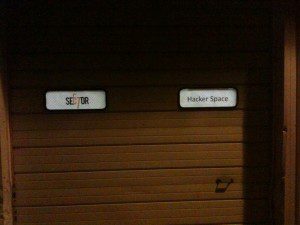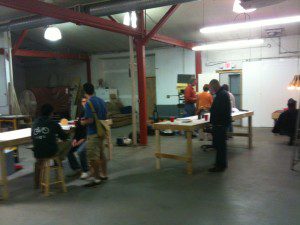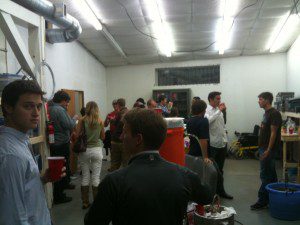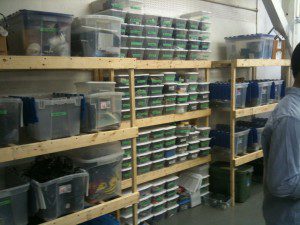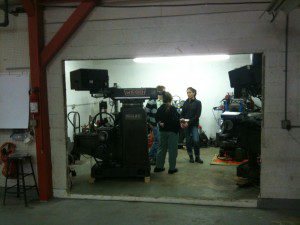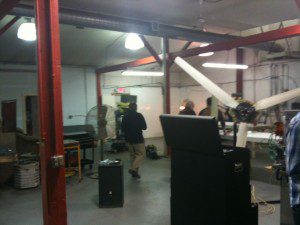The Wikipedia page for Coworking is a good overview, but to sum it up in a few words, it’s like working out of a coffeeshop but without the coffeeshop. As “going to the office” becomes less mandatory for people, or even impossible, a coworking space provides something other than a spare bedroom or the kitchen table as a workspace. This is good for the social aspect – there’s something to be said for getting out and seeing people in the day, or just to be out of the house when working and keeping a clean life/work separation. It’s better than a coffeeshop, or even the public library, in that it’s a little more designed to be a workspace first. In a coworking space, you can be more comfortable leaving your laptop unattended, or they may have a temporary quiet room with a door that you can use for phone calls or a videoconferencing space.
The coffeeshop analogy masks one part of the social aspect of the coworking space – you’re much more likely to engage with the other people at the coworking space than you are at a coffeeshop. For small or single person firms, having other people around to bounce ideas around or otherwise give feedback is a tremendous boost that you won’t get from working out of a spare bedroom.
The Madison Coworking Community is working to bring a coworking space to Madison, and is currently searching for a space around the Square or down the E Wash corridor, and hopes to open in the next month or so. They’re expecting that if you just want to work there one or two days, it’s free to try it out, but after that there’s a monthly membership.
I hope that this space is only the first of multiple coworking spaces in Madison – in fact, I hope that we start seeing development projects that also include something like a coworking space. I’m not thinking the 50-square foot “business centers” hotels and a few apartment complexes feature, but instead something more inviting. Coworking spaces would be great as part of a larger, denser complex in the downtown (Hello potential developers for 800 E Wash.) Perhaps they could partner with area employers – Epic brings a ton of new people to town every year, many of who live downtown. A coworking space/Epic space right in an apartment building Epic employees/residents could use, and skip the commute to Verona a few days a week or on snow days, would be an attractive incentive. Combine it with a deal for new employees and your recruiting will get a bit easier, and your employees will be better off.
The second space that people should know about is a “Hackerspace” (or, also commonly, a “Makerspace”.) The easy explanation of a hackerspace is a communal version of the garage workshop. There are three primary reasons people choose to work out of a Hackerspace instead of their garage: people don’t always have a garage, Hackerspaces often have specialized equipment not found in every garage, and finally, Hackerspaces are a way to bring similarly-interested people together.
If you think I’ve just described a co-op (or, for many readers of this blog, an infoshop) you’re right, they’re basically the same thing. The differentiating feature of a hackerspace is probably the target audience and motivation: a hackerspace member is typically there to make something, and usually has a more technological bent. You’re more likely to build a radio-controlled airplane at a hackerspace than you are to do a glass-bending art project or milling out replacement gears for your car (though you probably wouldn’t be turned away if you wanted to do either)
A hackerspace tries to provide people with access to resources they might not otherwise have. This helps in three ways: obviously, if you have no garage, a hackerspace is a godsend. Even if you have a garage, there are many larger machines like CNC milling machines or the rapid prototyping machines that I write about again and again that are expensive or bulky and can’t be justified without keeping them busy. Finally, it’s not just a matter of a few expensive tools, there are many more specialized tools that aren’t individually expensive but to build a complete collection is prohibitive. Bringing them all together in one space can make you more productive.
Hackerspaces fill an important niche in the economic development spectrum. They’re not business incubators – they’re pre-incubators. Small projects might get started for fun, and only later might someone say “Hey, this can go somewhere”. Equally important are the projects that go nowhere or are failures – the hackerspace provides a low-cost way to learn, and those experiences will help the next time around. Of course, the social aspect here is huge – rather than two people meeting and then starting a company out of one of their garages, the hackerspace brings people together and puts them in a garage straightaway. As the hackerspace movement spreads, we’ll see more and more companies that get their start in one.
Of course, hackerspaces might not lead to new companies – they’re every bit as valuable if members just use the space to upgrade their own skills. I learned at least as much about computer science in the Undergraduate Projects Lab (basically a hackerspace but for software only) at the UW as I did in my classes. A smarter workforce is worth just as much as a bunch of startups.
Existing companies will be able to use hackerspaces, particularly for their collection of tools. For an absolutely fascinating read, Chris Anderson’s piece “In the Next Industrial Revolution, Atoms are the New Bits” from Wired a few months back looks at the rise of a new class of companies that are able to prototype on the small, and hand production off to other companies that can aggregate many small batches of different products together but still achieve economies of scale. Madison is perfectly positioned to be part of the design side of this equation, and having a hackerspace in Madison will strengthen our ability to foster such companies. (Similarly, one of the challenges of the next decade will be how to bring the outsourced production back from China. It’s a topic for another day, but there’s a lot more to running such a company than just low wages, and on all of that we can compete today. )
There’s a hackerspace here in Madison – Sector 67. Located in the old Anderson-Thomas building on Winnebago, just off of Atwood, they had their grand opening on Friday night. It’s a perfect space, and I’m excited to see what comes out of it. See below for some (crappy iPhone) photos. (As an aside, in some of the pictures, you’ll see people who are also involved in the coworking space, and if you followed it, the “MadFiber cabal” from this spring, when the Madison answered Google’s RFI for a new, ultra-high speed broadband network. Keep your eye on these folks –they’re doing good work for Madison, pretty much outside of the usual politics, Old-Boy Networks, or otherwise usual suspects that typically define how things get done in Madison)

